Triumvirate
A triumvirate (Latin: triumvirātus) is a political regime ruled or dominated by three powerful individuals known as triumvirs (Latin: triumviri). The arrangement can be formal or informal. Though the three are notionally equal, this is rarely the case in reality. The term can also be used to describe a state with three different military leaders who all claim to be the sole leader.
In the context of the Soviet Union and Russia, the term troika (Russian for "group of three") is used for "triumvirate". Another synonym is triarchy.
Roman triumvirates
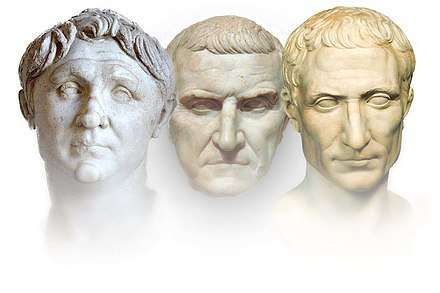
Originally, triumviri were special commissions of three men appointed for specific administrative tasks apart from the regular duties of Roman magistrates. The triumviri capitales, for instance, oversaw prisons and executions, along with other functions that, as Andrew Lintott notes, show them to have been "a mixture of police superintendents and justices of the peace."[1] The capitales were first established around 290 to 287 BC.[2] They were supervised by the praetor urbanus. These triumviri, or the tresviri nocturni,[3] may also have taken some responsibility for fire control. [4] The triumviri monetalis ("triumviri of the temple of Juno the Advisor" or "monetary triumvirs") supervised the issuing of Roman coins.
Three-man commissions were also appointed for purposes such as establishing colonies (triumviri coloniae deducendae) or distributing land.[5] Triumviri mensarii served as public bankers;[6] the full range of their financial functions in 216 BC, when the commission included two men of consular rank, has been the subject of debate.[7] Another form of three-man commission was the tresviri epulones, who were in charge of organizing public feasts on holidays. This commission was created in 196 BC by a tribunician law on behalf of the people, and their number was later increased to seven (septemviri epulones).[8]
The term is most commonly used by historians to refer to the First Triumvirate of Julius Caesar, Marcus Licinius Crassus, and Pompey the Great, and the Second Triumvirate of Octavianus (later Caesar Augustus), Mark Antony, and Marcus Aemilius Lepidus.
Biblical triumvirates
In the Bible triumvirates occurred at some notable events in both the Old Testament and New Testament. In the Book of Exodus Moses, his brother Aaron and, according to some views their nephew or brother-in-law, Hur acted this way during Battle of Rephidim against the Amalekites.[Exodus 17:10][9] In the Gospels as a leading trio among the Twelve Apostles at three particular occasions during public ministry of Jesus acted Peter, James, son of Zebedee and his brother John. They were the only apostles present at the Raising of Jairus' daughter[Mark 5:37], Transfiguration of Jesus [Matthew 17:1] and Agony in the Garden of Gethsemane[Matthew 26:37]. Later, at the time of the Early Christian Church this triumvirate of the leading apostles changed slightly after the former James’s death, as it became composed of Peter, John and James, brother of Jesus.[Galatians 2:9][10]
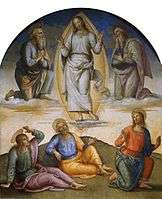 Peter (sitting in the centre) along with John and his brother James, son of Zebedee (sitting L-R) at the Transfiguration of Jesus.
Peter (sitting in the centre) along with John and his brother James, son of Zebedee (sitting L-R) at the Transfiguration of Jesus.
Chinese triumvirates
One of the most notable triumvirates formed in the history of China was by the Han Dynasty (202 BCE – 220 CE) statesmen Huo Guang (d. 68 BCE), Jin Midi (d. 86 BCE), and Shangguan Jie 上官桀 (d. 80 BCE), following the death of Emperor Wu of Han (r. 141–87 BCE) and the installation of the child emperor Zhao.
Despite the Three Excellencies—including the Chancellor, Imperial Secretary, and irregularly the Grand Commandant—representing the most senior ministerial positions of state, this triumvirate was supported by the economic technocrat and Imperial Secretary Sang Hongyang (d. 80 BCE), their political lackey. The acting Chancellor Tian Qianqiu was also easily swayed by the decisions of the triumvirate.[11]
The Three Excellencies existed in Western Han (202 BCE – 9 CE) as the Chancellor, Imperial Secretary, and Grand Commandant, but the Chancellor was viewed as senior to the Imperial Secretary while the post of Grand Commandant was vacant for most of the dynasty. After Emperor Guangwu established the Eastern Han (25–220 CE), the Grand Commandant was made a permanent official while the Minister over the Masses replaced the Chancellor and the Minister of Works replaced the Imperial Secretary. Unlike the three high officials in Western Han when the Chancellor was senior to all, these new three senior officials had equal censorial and advisory powers. When a young or weak-minded emperor ascended to the throne, these Three Excellencies could dominate the affairs of state. There were also other types of triumvirates during the Eastern Han; for example, at the onset of the reign of Emperor Ling of Han (r. 168–189), the General-in-Chief Dou Wu (d. 168), the Grand Tutor Chen Fan (d. 168), and another prominent statesman Hu Guang (91–172) formed a triumvirate nominally in charge of the Privy Secretariat, when in fact it was a regent triumvirate that was overseeing the affairs of state and Emperor Ling.[12]
Hinduism
In Hinduism, the gods Brahma, Vishnu and Shiva form the triumvirate Trimurti "in which the cosmic functions of creation, maintenance, and destruction are personified" respectively by those gods.."[13]
Tamil Triumvirate (in South India)
Tamil Triumvirate refers to the triumvirate of Chola, Chera, and Pandya who dominated the politics of the ancient Tamil country.
Modern triumvirates
The title was revived a few times for (short-lived) three-headed political 'magistratures' in post-feudal times.
Ottoman Empire
The Three Pashas also known as Ottoman Triumvirate effectively ruled the Ottoman Empire during World War I: Mehmed Talaat Pasha (1874–1921), the Grand Vizier (prime minister) and Minister of the Interior; Ismail Enver Pasha (1881–1922), the Minister of War; and Ahmed Djemal Pasha (1872–1922), the Minister of the Navy.
Early-modern and modern France
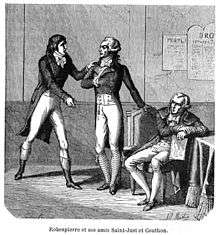
While French Huguenots had derisively bestowed the name Triumvirate on the alliance formed in 1561 between Catholic Francis, Duke of Guise, Anne de Montmorency, and Jacques Dalbon, Seigneur de Saint Andre during the French Wars of Religion, in later years the term would be used to describe other arrangements within France.
At the end of the 1700s, when the French revolutionaries turned to several Roman Magistrature names for their new institutions, the three-headed collective Head of State was named Consulat, a term in use for two-headed magistratures since Antiquity; furthermore it included a "First Consul" who was not an equal, but the de facto solo head of state and government – a position Napoleon Bonaparte chose to convert openly into the First French Empire.
Prior to Napoleon and during the Terror Robespierre, Louis de Saint-Just, and Couthon, as members of the governing Committee of Public Safety, were purported by some to have formed an unofficial triumvirate. Although officially all members of the committee shared equal power the three men's friendship and close ideological base led their detractors to declaim them as triumvirs which was used against them in the coup of 9 Thermidor.
Pre-Independent India
In the early days of the national struggle and before Gandhi, the Indian National Congress was known to be under Lal-Bal-Pal i.e. Lala Lajpat Rai, Bipin Chandra Pal and the leader of the three Balgangadhar Tilak often dubbed Lokmanya Tilak.
Modern Israel
- 2008–2009: Former Prime Minister Ehud Olmert, Defense Minister Ehud Barak, and Minister of Foreign Affairs Tzipi Livni were sometimes referred to as a triumvirate.[14][15][16]
- 2012: The leadership of Shas, the ultra-orthodox Sepharadi political party of Israel, was given by its spiritual leader, Rabbi Ovadia Yosef and the Council of Torah Sages, to a triumvirate formed by the convicted Aryeh Deri, who decided to return to politics after a thirteen-year hiatus, the former party leader Eli Yishai and Ariel Atias.
People's Republic of China
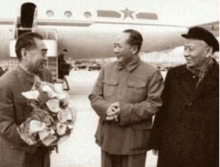
Mao Zedong, Zhou Enlai, and Liu Shaoqi had the biggest contribution to the foundation of the People's Republic of China in 1949 and are regarded as the three most influential members of the first generation of the Chinese communist leaders. Mao and Zhou died in 1976 while holding the highest party and state offices Chairman of the CPC Central Committee (Mao), Premier of the State Council (Zhou). Liu was the Chairman of the Standing Committee of the National People's Congress and President of the People's Republic of China, nominal de jure head of state, until 1968 when he was purged in the cultural revolution. He died in late 1969 under harsh treatment.[17]
Benin
- 13 April 1970 until 26 October 1972: After the contentious 1970 presidential elections, the country of Benin (then known as the Republic of Dahomey) adopted a Presidential Council which included the three main political figures in the country: Hubert Maga, Justin Ahomadégbé-Tomêtin, and Sourou-Migan Apithy. In addition, the formal office of President would rotate between the three of them beginning with Hubert Maga. After one successful change of leadership, military leader Mathieu Kérékou staged a coup and overthrew the Presidential Council becoming the leader of the country until 1991.[18]
Soviet Union
- See also List of Troikas in the Soviet Union
- May 1922 – April 1925: When Vladimir Lenin suffered his first stroke in May 1922, a Troika was established to govern the country in his place, although Lenin briefly returned to the leadership from 2 October 1922 until a severe stroke on 9 March 1923 ended Lenin's political career. The Troika consisted of Lev Kamenev, Joseph Stalin, and Grigory Zinoviev. The Troika broke up in April 1925, when Kamenev and Zinoviev found themselves in a minority over their belief that socialism could only be achieved internationally. Zinoviev and Kamenev joined forces with Leon Trotsky's Left Opposition in early 1926.[19] Later, Kamenev, Zinoviev and Trotsky would all be murdered on Stalin's orders.
- 13 March – 26 June 1953: After the death of Joseph Stalin in March 1953, power was shared between Lavrenty Beria, Georgy Malenkov, and Vyacheslav Molotov.
- 14 October 1964 – 16 June 1977: After the removal of Nikita Khrushchev in October 1964, the Soviet Union went through a period of collective leadership. Power was initially shared between Premier Alexei Kosygin, General Secretary Leonid Brezhnev and Chairman of the Presidium Anastas Mikoyan. Mikoyan was replaced by Nikolai Podgorny in 1965.
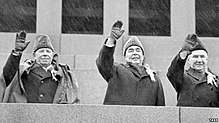
Modern Italy
In the Roman Republic (1849), the title of two sets of three joint chiefs of state in the year 1849:
- 29 March – 1 July 1849: Carlo Armellini (b. 1777 – d. 1863), Giuseppe Mazzini (b. 1805 – d. 1872), and Conte Aurelio Saffi (b. 1819 – d. 1890)
- 1–4 July 1849: Aurelio Saffi (again), Alessandro Calandrelli (b. 1805 – d. 1888), and Livio Mariani (no dates available)
Modern Greece
- After the downfall of the first King of Greece, the Bavarian Otto, on 23 October 1862, and Dimitrios Voulgaris' unsuccessful term (23 October 1862 – 30 January 1863) as president of the Provisional Government, a Triumvirate (30 January – 30 October 1863) was established consisting of the same Dimitrios Voulgaris, the renowned Admiral Konstantinos Kanaris and Benizelos Rouphos, which acted as a regency until the arrival of the new monarch, the first "King of the Hellenes", George I.
- A triumvirate was established to head the Theriso revolt of 1905 in autonomous Crete, consisting of Eleftherios Venizelos (later Prime Minister of Greece) in charge of organisational matters, Konstantinos Foumis in charge of finances and Konstantinos Manos, the former mayor of Chania, in charge of military affairs.
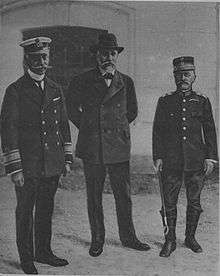
- A triumvirate was set up during the First World War in September 1916, to head the "Provisional Government of National Defence" in Thessaloniki. It consisted of the popular liberal statesman Eleftherios Venizelos, General Panagiotis Danglis and Admiral Pavlos Koundouriotis. This "Triumvirate of National Defence" functioned as a collective head of government, although effective control was in Venizelos' hands. With the abdication of King Constantine I in June 1917 and the reunification of the country under Venizelos, the triumvirate was dissolved. The Triandria municipality in Thessaloniki is named after this triumvirate.
- A triumvirate was set up on 13 September 1922 to lead the military revolt against the royalist government in Athens in the aftermath of the Asia Minor Disaster. It was composed of Colonels Nikolaos Plastiras and Stylianos Gonatas, and Commander Dimitrios Fokas. The triumvirate assumed the government of Greece on 15 September, and would control the country until it laid down its powers on 2 January 1924. Plastiras however quickly became the dominant figure among the triumvirate, and was eventually labelled as the "Chief of the Revolution".
- A de facto triumvirate existed during the early years of the Greek military junta of 1967–1974, when the junta's three main leaders were Colonel Georgios Papadopoulos, Brigadier Stylianos Pattakos and Colonel Nikolaos Makarezos. With the increasing predominance of Papadopoulos from 1970 on, this triumvirate ceased to function.
- The Greek People's Liberation Army, active during the Axis Occupation of Greece, had a triadic leadership structure, consisting of the kapetánios ("captain", the unit's leader), the stratiotikós (the military specialist, usually a former Army officer) and the politikós (the political representative of the National Liberation Front).
Argentina
- First Triumvirate (23 September 1811 – 8 October 1812):
- Feliciano Chiclana.
- Manuel de Sarratea.
- Juan José Paso, replaced by Juan Martín de Pueyrredón on 23 March 1812.
- Second Triumvirate (8 October 1812 – 31 January 1814):
- Nicolás Rodríguez Peña.
- Antonio Álvarez Jonte, replaced by Gervasio Antonio de Posadas on 19 August 1813.
- Juan José Paso, replaced by José Julián Pérez on 20 February 1813, and replaced by Juan Larrea on 5 November 1813.
- Third Triumvirate (18 April 1815 - 20 April 1815):
- Military Junta (28 June 1966 - 29 June 1966):
- Pascual Pistarini.
- Benigno Ignacio Varela.
- Adolfo Teodoro Álvarez.
- Junta of Commanders of the Armed Forces (8 June 1970 - 18 June 1970):
- Pedro Alberto José Gnavi, President.
- Carlos Alberto Rey.
- Alejandro Lanusse.
- Junta of Commanders of the Armed Forces (23 March 1971 - 26 March 1971):
- Alejandro Lanusse, President.
- Pedro Alberto José Gnavi.
- Carlos Alberto Rey.
- Military Junta (24 March 1976 - 29 March 1976):
The Americas
.svg.png)

.svg.png)
- Interim Triumvirate, 5 October – 23 November 1814
- José María del Castillo y Rada
- José Joaquín Camacho
- José Fernández Madrid
- Triumvirate of the United Provinces of New Granada, 23 November 1814 – October 1815
- Custodio García Rovira
- Antonio Villavicencio, replaced Rovira during his second term as he could not preside over
- José Manuel Restrepo, was never sworn in.
- José Miguel Pey de Andrade, replaced Restrepo as he declined. 28 July 1815
- Manuel Rodríguez Torices
- Custodio García Rovira
- Interim Triumvirate, 5 October – 23 November 1814

- 29 May – 22 August 1866 – 1st Triumvirate (in rebellion against Buenaventura Báez from 1 May 1866):
- Pedro Antonio Pimentel (b. 1830 – d. 1874; formerly one of three "Generals-in-Chief" 23–24 January 1865)
- Gregorio Luperón (b. 1839 – d. 1897) PA
- Federico de Jesús García
- 26 September 1963 – 25 April 1965 – 2nd Triumvirate:
- Emilio de los Santos (b. 1903 – 22 December 1963) (chairman from 29 December 1963, succeeded by Donald Reid Cabral, b. 1923, UCN, new chairman)
- Manuel Enrique Tavares Espaillat (b. 1924 - d. 1984)
- Ramón Tapia Espinal (b. 1926 – d. 2002)
- 29 May – 22 August 1866 – 1st Triumvirate (in rebellion against Buenaventura Báez from 1 May 1866):



European Union
After the Lisbon Treaty came into force from 1 December 2009:
Business slang
Eric Schmidt, CEO of Google has referred to himself, along with founders Larry Page and Sergey Brin as part of a triumvirate, stating, "This triumvirate has made an informal deal to stick together for at least 20 years".[21]
Other triumvirates
The word has been used as a term of convenience, though not an official title, for other groups of three in a similar position:
- Ottoman Triumvirate is another name for the Ottoman Interregnum
- The "Three Pashas" formed a triumvirate that de facto governed the Ottoman Empire in World War I.
- Great Triumvirate (19th Century American Politics – Henry Clay, Daniel Webster, and John C. Calhoun)
- Great Triumvirate (Early 20th century golf – Harry Vardon, James Braid, and J.H. Taylor)
- Polish and Czechoslovak Council of Three (World War II resistance governments)
- Tuscan Triumvirate (Middle Ages Italian Poets – Dante, Boccaccio, and Petrarch)
- Trimurti - A Hindu triumvirate consisting of the gods of Creation (Brahma), Preservation (Vishnu), and Destruction (Shiva)
- Holy Trinity (God the father, Jesus the son, and the Holy Spirit)
- Triumvirate of Charles Town (Kamehameha Triumvirate) Patrick, Hayden, Austin (Of unknown origin or surname)
- The Triumvirate of Yavapai County - Fraser, Cooper, Cuevas - DSD Leaders
- Rush (band) - Neil Peart, Alex Lifeson, and Geddy Lee - Canadian Progressive Rock Band nicknamed by their fans as "The Holy Triumvirate"
See also
- Constitution of the Roman Republic
- Council of Three (disambiguation)
- Monarchy, Diarchy, Tetrarchy, Decemvirate
- Septemvir
- Duumviri
- First Triumvirate
- Second Triumvirate
Notes
- Andrew Lintott, Violence in Republican Rome (Oxford University Press, 1999, 2nd ed.), p. 102 online.
- Livy, Periocha 11.
- Triumviri or tresviri nocturni may be another name or nickname for the capitales, because their duties often pertained to the streets at night.
- John E. Stambaugh, The Ancient Roman City (Johns Hopkins University Press, 1988), p. 347, note 4 online and p. 348, note 13; O.F. Robinson, Ancient Rome: City Planning and Administration (Routledge, 1994), p. 105 online.
- Andrew Lintott, The Constitution of the Roman Republic (Oxford University Press, 1999), pp. 12 and 95 online.
- Jean Andreau, Banking and Business in the Roman World (Cambridge University Press, 1999), p. 115 online.
- Rachel Feig Vishnia, State, Society, and Popular Leaders in Mid-Republican Rome, 241-167 B.C. (Routledge, 1996), p. 86ff. online.
- Livy 33.42.1; Vishnia, State, Society, and Popular Leaders, p. 171; Fergus Millar, Rome, the Greek World, and the East (University of North Caroline Press, 2002), p. 122 online; Lintott, Constitution, p. 184.
- "Dictionary of World Biography". Retrieved 2015-08-18. Cite journal requires
|journal=(help) - "Galatians 2:9 And recognizing the grace that I had been given, James, Cephas, and John--those reputed to be pillars--gave me and Barnabas the right hand of fellowship, so that we should go to the Gentiles and they to the Jews". biblehub.com.
- Loewe (1986), 178.
- Beck (1986), 319.
- For quotation defining the trimurti see Matchett, Freda. "The Purāṇas", in: Flood (2003), p. 139.
- Ladies and gentlemen, your next government, By Amir Oren, Published: 13 January 2009, Haaretz Daily Newspaper
- Diplomacy: Endgame politics, By HERB KEINON, January 8, 2009, Jerusalem Post
- Israel launches PR blitz ahead of Gaza operation, Roni Sofer, Published: 12.21.2008, Ynetnews
- Angela P. Cheater, Department of Sociology, University of Zimbabwe (29 June 1989). "Managing Culture en Route to Socialism: The Problem of Culture 'Answering Back'" (PDF). msu.edu. Michigan State University. Retrieved 4 December 2016.CS1 maint: multiple names: authors list (link)
- Decalo, Samuel (1973). "Regionalism, Politics, and the Military in Dahomey". The Journal of Developing Areas. 7 (3): 449–478.
- Rappaport, Helen (1999). Joseph Stalin: A Biographical Companion. ABC-CLIO. pp. 141, 326. ISBN 978-1576070840.
- Lachman, Seymour & Polner, Robert (2006). Three Men in a Room: The Inside Story of Power and Betrayal in an American Statehouse. New York : New Press.
- Tim Weber (2008-09-04), A decade on: Google's internet economy, BBC News, retrieved February 10, 2013
References
- Beck, Mansvelt. (1986). "The Fall of Han," in The Cambridge History of China: Volume I: the Ch'in and Han Empires, 221 B.C. – A.D. 220. Edited by Denis Twitchett and Michael Loewe. Cambridge: Cambridge University Press. ISBN 0-521-24327-0.
- Flood, Gavin (Editor) (2003). The Blackwell Companion to Hinduism. Malden, MA: Blackwell Publishing Ltd. ISBN 1-4051-3251-5.CS1 maint: extra text: authors list (link)
- Loewe, Michael. (1986). "The Former Han Dynasty," in The Cambridge History of China: Volume I: the Ch'in and Han Empires, 221 B.C. – A.D. 220, 103–222. Edited by Denis Twitchett and Michael Loewe. Cambridge: Cambridge University Press. ISBN 0-521-24327-0.
- Etymology on line
- World Statesmen here Greece - see under each present country